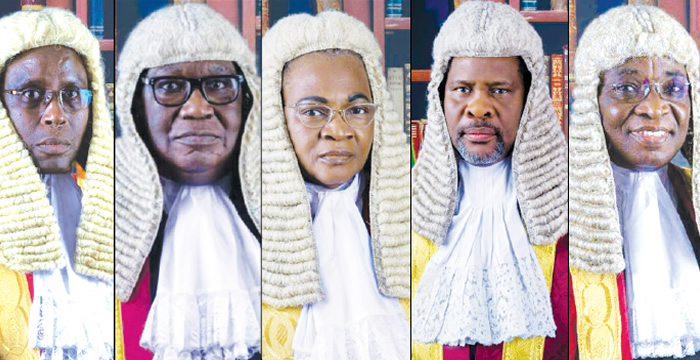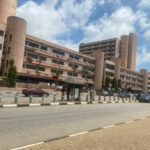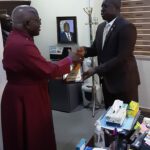
As the Presidential Election Tribunal gives its verdict today, STEPHEN ANGBULU examines the intrigues surrounding the judgment, which coincides with President Bola Tinubu’s 100th day in office.
The 100-day mark in office is a celebrated benchmark for most Presidents and elected public office holders. It is an opportunity to assess the early successes and challenges as new presidents set the tone for their nascent administration, capitalising on the momentum and public attention of their recent election.
For President Bola Tinubu, however, the 100th day is a stark reminder that, despite being sworn in as President on May 29, 2023, his electoral victory still hangs in the balance as pundits continue to guess the final judgment of the presidential election petition tribunal sitting today.
Ahead of the judgment of the PEPT, the Labour Party National Chairman, Julius Abure, stated that his party has faith in the judiciary to deliver the proper judgment. The LP chairman accused the All Progressive Congress of stealing a mandate freely given to his party by Nigerians.
Abure while addressing some Nigerians in the United States last week, said, “We are expecting judgment between now and the 16th of September. And I am very sure Peter Obi will become President.
“Without sounding immodest, since they took over, things are now worse. The only party and the only candidate that has solutions to the challenges of the country is the Labour Party and Peter Obi. And so we still believe that things will change in Nigeria.’’
In the Peoples Democratic Party, the prospects are no different. Director of Strategy and Research of the PDP Presidential Campaign Council, Pedro Obaseki, expressed confidence that the five justices on the PEPT would summon the courage to deal with the issues, facts, and evidence presented by the opposition parties in their various petitions challenging the results of the 2023 presidential election.
But speaking on Channels Television’s Politics Today, the President’s Special Adviser on Media and Publicity, Ajuri Ngelale, affirmed that President Bola Tinubu was “not worried” about the outcome of Wednesday’s judgment.
“He’s not worried simply because he knows he won the election. We believe that we have presented the best case. We believe that we have the evidence on our side. We believe that we have the most talented legal team in the country that is working with the best facts available to any candidate,” said Ngelale.
Whatever led to the bickering of the past few weeks is traceable to March 1, 2023, when the Independent National Electoral Commission announced Tinubu as the winner of the 2023 presidential election.
The former Lagos State Governor secured 8,794,726 votes to defeat Atiku Abubakar of the PDP, who garnered 6,984,520, and Peter Obi of the Labour Party, who polled 6,101,533 votes.
Unsatisfied with the outcome, five political parties – the PDP, LP, Action Peoples Party, Allied Peoples Movement, and the Action Alliance, filed separate petitions before the tribunal seeking to annul Tinubu’s victory.
But he is not alone.
At least 25 state governors are also marking their 100th day in office and are sitting on the edge of their crested seats, awaiting the tribunals’ verdicts handling the presidential, governorship, National Assembly, and state assembly election petitions.
Out of the 28 states where the governorship elections were held, the results of the polls announced by the Independent National Electoral Commission are being contested in no fewer than 25 states.
Most of the tribunals sitting in Lagos, Sokoto, Delta, Kano, and 21 other states as well as the FCT, had reserved their judgments after the parties concluded their hearings and adopted their written judgment following the Practice Direction for the election petitions issued by the President of the Court of Appeal, Justice Monica Dongban-Mensen.
In November 2022, months before the 2023 polls, Nigeria’s Chief Justice, Justice Olukayode Ariwoola, swore in 307 justices to handle the election petitions.
On May 25, 2023, 39 more justices were inaugurated, totalling 346 justices expected to deliver judgments before September 16. Section 285 (6) of the 1999 constitution provides that “an election tribunal shall deliver judgment in writing within 180 days from the date of filing of the petition.”
In the same month, the Presidential Election Petition Court commenced hearing the election petitions filed by the five candidates in February’s presidential poll.
The candidates have called on the five-person panel to dispense justice accordingly today.
For LP’s Peter Obi, the demands are five-fold. On eligibility, petitioners argue that APC’s Tinubu is ineligible to run for the top office. Obi’s lead counsel, Livy Uzoukwu, also argued that the president-elect “was not duly elected by a majority of the lawful votes cast at the time of the election.”
Second, because Tinubu was declared winner of the election without securing 25 percent in the FCT, Obi, and the LP want the tribunal to determine “that the 2nd Respondent (Tinubu) having failed to score one-quarter of the votes cast at the Presidential Election in the Federal Capital Territory, Abuja, was not entitled to be declared and returned as the winner of the presidential election held on February5y 2023.”
Obi also prayed the court to cancel the February 2the Februarytial election and compel INEC to conduct a fresh election. He then prayed the tribunal to issue an order preventing Tinubu and his running mate, Shettima, from participating in the fresh election.
For the PDP’s Abubakar, the demands are similar. At the court sitting in late July, the former Vice President said the fact that a presidential election had never been nullified before by a court in Nigerians is no grounds for the court to avoid “doing the right thing”
Lead counsel to Atiku and PDP, Chris Uche, SAN, said in his final address that day, “A subtle threat of apocalyptic catastrophe of national chaos and anarchy if a judgment is not given in a particular manner, cannot deter a court of law from doing justice.
“The court must do justice, rather ‘let the heavens fall’ but as courageously stated by the Supreme Court per Oguntade JSC, in the epic case of AMAECHI vs. INEC & ORS (2008) LPELR-446(SC) (Pp. 67-68 paras. D): ‘I must do justice even if the heavens fall.’ The truth, of course, is that when justice has been done, the heavens stay in place.”
However, in their final defence statement to the court, Mr Tinubu’s legal team, led by Wole Olanipekun, said any other interpretation different from what they had presented to the tribunal would lead to absurdity, chaos, anarchy and “alteration of the very intention of the legislature.”
Having heard all sides, here are the persons deciding Tinubu’s fate today.
Haruna Tsammani, 64, was appointed a Justice of the appeal court in 2010. Called to the Bar in 1983, he was appointed a high court judge in Bauchi State on September 17, 1998.
Tsammani is not a rookie when it comes to electoral tribunal sittings. In December 2015, he was part of the five-person panel of the Appeal Court that dismissed an appeal instituted by a former governor of Oyo State, Rashidi Ladoja, against the election of the then-governor Abiola Ajimobi (now late).
Justice Stephen Adah, 66, hails from Kogi State. He graduated from the Nigerian Law School in 1982 and now heads the Asaba Division of the Court of Appeal.
Adah was appointed as a judge of the Federal High Court on November 122, 1998, and was one of the justices promoted to the Appeal Court in November 2012.
He is best known for his landmark judgment delivered in an appeal filed by the Economic and Financial Crimes Commission in 2020 against a trial court’s decision, which partially upheld the no-case submission filed by former President Goodluck Jonathan’s cousin, Robert Azibaola.
Justice Misitura Bolaji-Yusuf was born on August 77, 1959. She hails from Oyo State and attended the Obafemi Awolowo University between 1979 and 1983 and later, the Nigerian Law School from 1983 to 1984.
Bolaji-Yusuf was appointed as a justice in the Oyo State High Court on January 300, 1997, where she delivered major judgments. She was later appointed to the Court of Appeal on March 244, 2014.
One of her lead judgments was delivered at the hearing of an N5.6bn pension scam in Oyo State. The case involved the EFCC and 12 other persons in the Oyo State civil service.
She was on the panel that affirmed the authenticity of the candidates of the Godwin Obaseki-led faction to participate in the Edo State 2023 elections. She ranks 31st on the senior hierarchy list of the Court of Appeal.
The Bayelsa-born justice hails from Kolokuma/Opokuma Local Government Area of the state. Born in 1965, Ugo began his education at the State school, Igbedi in Bayelsa State from 1972 to 1978.
Justice Ugo was appointed as a Justice of the High Court of Bayelsa State in March 2006. He became an appellate court justice in March 2014 and ranks 44th on the seniority list of the Court of Appeal.
Justice Bello, 62, hails from Kano State. He attended the Nigerian Law School in 1985. In 2010, he was appointed to the High Court of the Federal Capital Territory.
Bello presided over the Nasarawa State Governorship Election Tribunal in 2019 where the PDP governorship candidate in the 2019 polls, David Ombugadu, had filed a suit against INEC and Governor Abdullahi Sule of the All Progressive Congress.
However, Bello rejected the petition on the grounds that it lacked merit, noting that the petitioner’s claims of excessive voting and electoral violence could not be substantiated. He is ranked 71st on the seniority list of the Court of Appeal.













